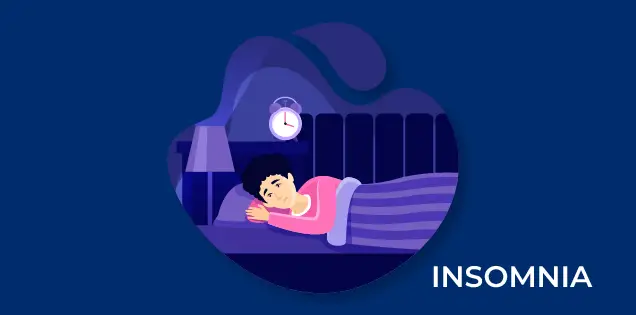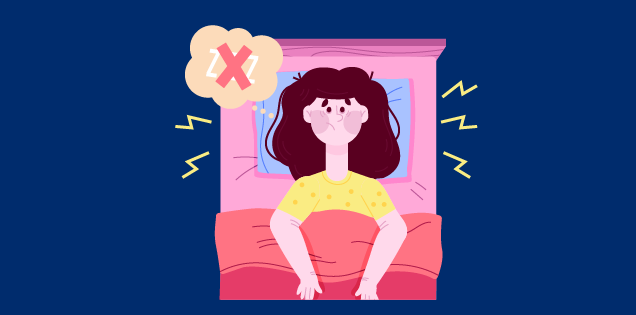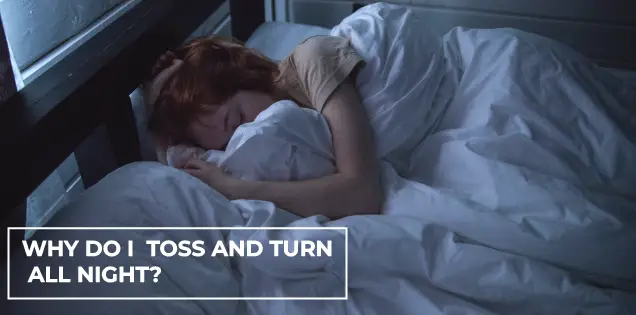It’s irritating, uncomfortable, and time-consuming to toss and turn for hours every night while attempting to sleep.
Nights full of tossing and turning can get triggered by several things, like anxiety, stress, and overstimulation, which can disrupt REM(Rapid eye movement) sleep.
In this article, we’ll discuss the possible causes of your tossing and turning at night and provide suggestions for putting an end to this.
Why Do I Toss and Turn All Night Long?

Various factors, like anxiety, overstimulation, or a medical condition, can bring a restless night’s sleep. Consider a few of the factors that could be at play here.
Anxiety

Problems falling asleep and staying asleep are common symptoms of anxiety disorders.
According to a study conducted in 2017, somatic anxiety negatively affects good sleep. When your mind is nervous and racing, your body may feel restless, causing you to toss and turn more than usual.
Stress
It may be more challenging to go to sleep while experiencing the mental and physical symptoms associated with stress. For instance, if you go to bed every night with stiff muscles from tension, your body may have difficulty unwinding while trying to get some shut-eye. As a result, you may toss and turn.
A study conducted in 2017 found that medical students’ sleep quality declined considerably along with their stress levels.
Overstimulation

According to the National Sleep Foundation, the sleep hormone melatonin gets disrupted by the blue light generated by phones, TVs, and other electronic gadgets.
Awakening your senses with loud sounds or bright lights inside and outside your bedroom might increase your tossing and turning.
Poor Sleep Cycle
Inadequate sleep can be caused by going to bed too early or too late, or by going to bed when you aren’t exhausted.
Your ability to wind down and sleep well depends on how exhausted you are when you go to bed. This rule also applies to being on an irregular sleep schedule.
Oversleeping Before Bedtime
Research has proven that short daytime naps improve health, but taking excessive naps throughout the day might make it more challenging to fall asleep at night.
If you oversleep in the afternoon, you could find that you’re not quite tired enough to fall asleep again when bedtime rolls around. As a result, you may find yourself tossing and turning in bed.
Imbalanced Diet

Sleep quality can improve if you eat healthily and maintain a healthy weight. In addition to melatonin and other key sleep-regulating neurotransmitters, dietary nutrients significantly influence their creation.
Low-quality sleep and difficulty falling asleep are two symptoms of a nutritional imbalance.
Underlying Medical Conditions
Restless legs syndrome, sleep apnea, and insomnia are three of the most frequent medical problems that may cause poor sleep quality.
Restless Leg Syndrome
People with restless leg syndrome (RLS) have an irresistible need to walk constantly. However, the symptoms of restless leg syndrome (RLS) often manifest themselves during times of physical activities, such as while you’re lying in bed. Sleeplessness is common among those who desire to walk about all the time.
Sleep Apnea
Tossing and turning at night may also be a symptom of sleep apnea. Sleep apnea occurs when your breathing repeatedly stops and starts while you’re sleeping. This effect might make it difficult to get comfortable at night and lead to frequent awakenings.
Insomnia

The inability to sleep or remain asleep is the top indicator of insomnia. Many different medical and psychological issues might contribute to sleep deprivation. For example, if you have insomnia, you may toss and turn in bed because you can’t settle down.
Is Tossing and Turning a Sleep Disorder?
Tossing and turning are not recognized as sleep disorders. Various factors, including but not limited to worry, stress, overstimulation, an irregular sleep pattern, and so on, cause it.
How to Stop Tossing and Turning in Sleep?

A regular bedtime routine might help you have a restful sleep better if you have trouble falling or staying asleep.
- Make your bed comfortable and inviting – For good sleep hygiene, you should start by making your bedroom a relaxing place. To provide your body with a relaxing environment, it is advisable to invest in a high-quality bed.
- Get some rest and relax – Practicing relaxation methods may help ease stress and anxiety’s physiological effects. To wind down and prepare for sleep, you may try deep breathing exercises, meditation, guided imagery, or grounding exercises.
- Shut off all electrical devices – To help your body and mind wind down for the night, try to avoid using gadgets within an hour of bedtime. It’s time to put down the phone and pick up a book for your eyes instead.
- Be sure to keep moving around throughout the day – Exercising regularly will help you sleep better and feel more relaxed when night rolls around. A lack of physical activity throughout the day may contribute to an inability to wind down at night, so try to include more activity in your day.
- Maintain a regular sleeping pattern – The normal sleep cycle gets disrupted by numerous things, including travel and staying up too late. Consistently falling asleep at the same time each night may be facilitated by sticking to a regular sleep schedule.
- Keep your diet well-balanced – Getting a good night’s sleep depends on getting all the carbs, proteins, lipids, and other nutrients your body needs. Tryptophan, magnesium, vitamin B, and other nutrients may help regulate your hormones that control sleep and wakefulness.
Sleep apnea and insomnia, two more reasons for restless nights and waking up feeling exhausted, may be treated with the guidance of a medical specialist.
What Are the Best Ways To Address Restless Sleep?
Treating insomnia requires identifying its root cause. Even if you’ve tried everything to get a deep sleep without tossing and turning, you may still need to see a doctor or take other measures to end your restless sleep once and for all.
When to Talk to a Doctor?

If you’ve tried everything to improve your sleep quality but still can’t go to sleep, it’s time to make an appointment with a doctor.
They will inquire into your health background and ask about your daily and nighttime routines. Additional testing, such as a sleep study, may rule out more serious health issues.
Finding a treatment plan is the next step if your doctor has detected a disease that might be contributing to your sleep difficulties.
Sleep Hygiene Improvements
Poor sleep hygiene may have a significant impact on health at any age. Consistency in your sleep regimen, nighttime rituals, food, and exercise are all wonderful places to start when trying to improve your sleep health.
Finding the right mattress for your body’s demands and creating a relaxing space to sleep with as few interruptions as possible will help you get better sleep.
Keep a Sleep Journal

Writing down your sleeping habits in a notebook might help you better understand your sleep condition, including how long and how well you sleep. Chronic sleep deprivation poses risks to your health and the health of those around you.
In the journal, you can track your thoughts and feelings regarding your sleepless nights and the possible causes. This recording method might shed light on any patterns contributing to your inability to sleep well.
Final Words
Sleep quality and life might suffer if you toss and turn all night long.
A lack of sleep hygiene, an imbalanced diet, or even a medical condition may contribute to restlessness in the middle of the night.
A regular sleep pattern and eliminating distractions, including shutting off gadgets, will help you reduce your nighttime tossing and turning. However, pay the most attention to your sleep habits.
Make an appointment with your doctor if you have trouble sleeping and are concerned that a medical issue may be the cause.
